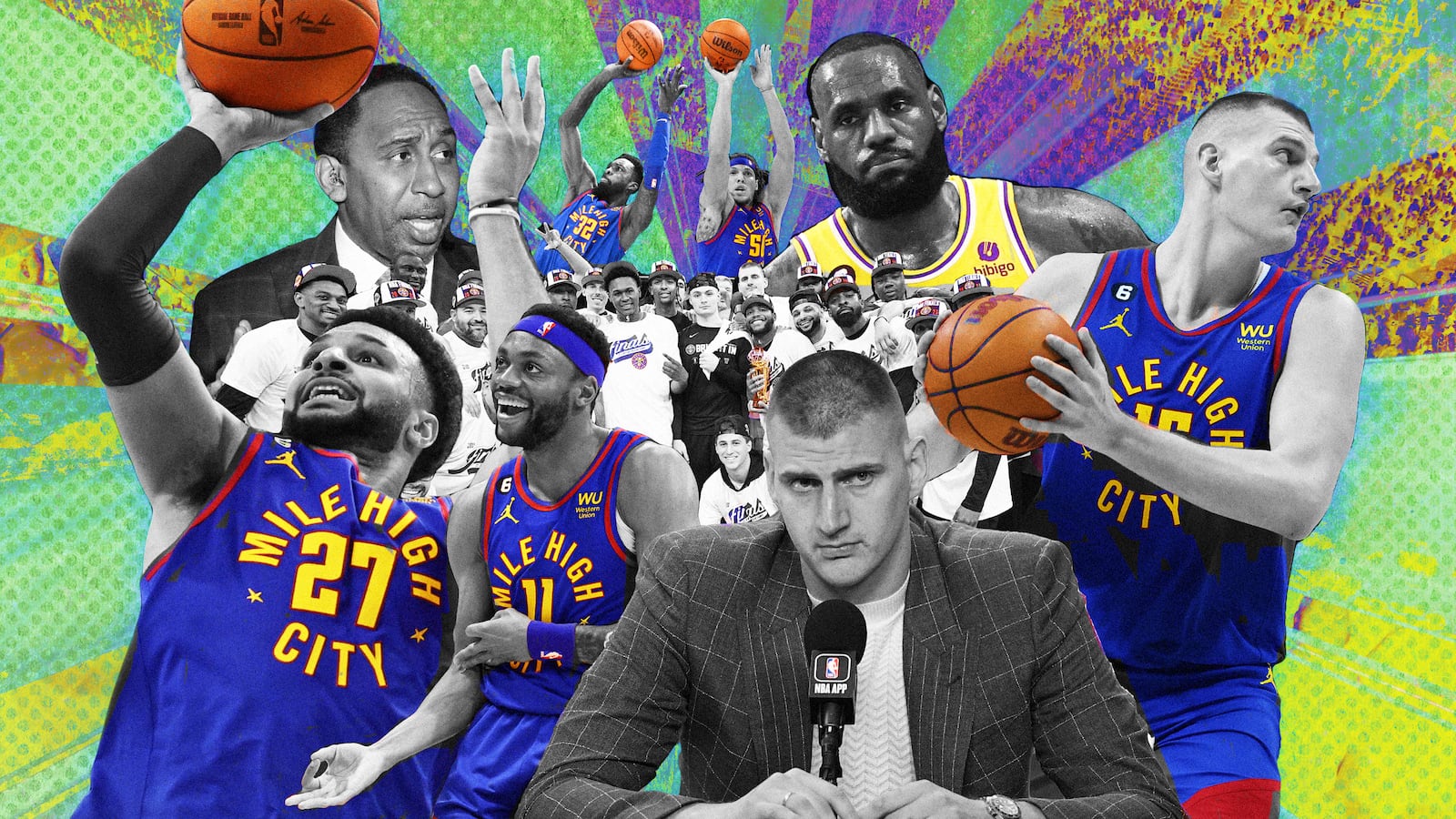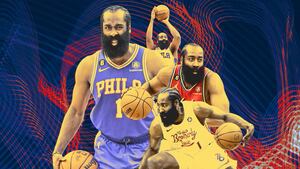Sometime last week, while Denver waited for the Boston Celtics to lose to the Miami Heat so they could face off against them in the NBA Finals, Chris Mannix, a second-to-third-tier basketball writer, went on the Rich Eisen Show. When Eisen asked if the Nuggets weren’t respected enough, riffing on coach Mike Malone who likes to run his mouth about this topic to reporters sometimes, Mannix said something along the lines of hey, look, they are respected actually, the media just doesn’t talk about the Nuggets because they’re just “not especially interesting.”
So what constitutes “respect” exactly? Does anyone on the Nuggets need this respect in any way? Does a team deserve respect for being good? When they get it, what exactly do they do with it? Can you trade it for goods and services? If they can’t, why would two grown men talk about this, exactly? Who awards respect? Is it the media? Randos on Twitter? God?
Mannix goes on to explain that Nikola Jokic, the team’s star center, doesn’t do media. Jammal Murray and Michal Porter Jr. aren’t compelling. It doesn’t matter that the team is the top seed in the west and just swept the Lakers in a conference final: the Lakers employ LeBron James and sucked for like 3/4th of the season, so they’re more interesting. He seems annoyed that the Nuggets persist in winning even though they provide you with nothing to talk about off the court.
Judging from the game this team brings to the court every night, Mannix’s analysis is complete bunk. The Nuggets are, basketball-wise, the most interesting team since the early Golden State Warrior squads that torched the league by playing mathematically perfect basketball every night. Jokic is compulsively watchable, unlike anyone else who has ever played the game, radiating mystical energy on the court and living a mysterious life as a chariot horse-racing enthusiast off the court. The team operates on inside-out offensive principles that a lot of people thought were gone forever in the NBA, the first effective modern-style spread offense that truly operates from the post.
If you were waking up every morning and looking to talk about the game of basketball, the Nuggets would be the first team you mentioned simply because they have been playing this strange, unique ball night after night after night.
But the sports media doesn’t really want to talk about sports. It’s not everyone, of course. Some people work away in niches, with their stats and their film, playing to a small audience of enthusiasts and doing good work. But, if you’re looking to make the big show, you gotta bring heat, and the Nuggets only really generate that on the court. They don’t publicly infight, their organization hasn’t done any stupid shit, no one is trying to get traded, or seems like they should try to get traded. LeBron is not on the team, stepping to the mic every night and heaving innuendo to Denver’s reporters, flecks of contextless information and cryptic sayings that can be extrapolated over the course of several hours on TV next morning.
And so, when they make the finals, a frustrated chill runs over the media omniplex who are committed to providing the public with a steady stream of NBA goop. All this is just basketball, they say. It’s impossible to produce what we need if we’re talking about just basketball.
There is a principle in urban planning known as “Induced Demand.” Imagine a city with a traffic problem. They look at the problem and conclude, not unreasonably, that more freeways would mean more space for drivers, which would ease the traffic problem. For a second, this works. But soon, more drivers fill the void, the roads jam up once again, and traffic is worse than ever. More space seems at first to be a liberating force, but it’s just an opportunity for the organism of traffic to grow into. Nature abhors a vacuum.
So it is with the sports media—all media, really. Once, the vast plains of sports media space were small, a few pages in a newspaper, a few minutes on an evening news broadcast. But, one day, someone decided to make a whole radio station about sports. This place demanded 24 hours of content. Now one might think, with all that space, that someone could reality get into the nitty-gritty of sports, really learn something about how the Knicks operate.
But, no, because that sort of stuff involves a lot of strenuous thought, and there’s a lot of space to fill. And you simply cannot fill all that space with the nitty-gritty, unless you want your talent to lose their minds in a vicious maze of tape and your audience to get bored to death by an unrelenting tidal wave of discussion about pick and roll coverages. So this space ended up being filled by chatter. Some of it may have been based in objective reality, but most of it was an evocation, a dredging-up of feelings you felt while you watched a game, padded and loaded with real-or-not-real evidence to justify whatever feeling you felt. Over time, this became something of an art form, an extended performance of masculine feeling, hiding behind a veneer of “Sports Analysis.”
The current master of this form is Stephen A. Smith. Stephen A. works for ESPN, hosting First Take, their morning show, and their pregame NBA coverage. He is often outraged about stuff, particularly the New York Knicks, who are often very bad in embarrassing ways. At his best, the viewer ends up losing all sense of reality, unable to figure out what’s the play and what is Hamlet slowly losing his mind as he enacts a campaign of revenge against his Uncle, the New York Knicks.
But even if it is impressive, it’s not really about sports. It’s about Stephen A., his weird brain and immaculate cadence, getting lost in the halls of his mind. When it goes bad, it goes bad in the way that everything on TV goes bad, because someone grifts for white grievance, says some weird retrograde sexist stuff, or acts too stupid. A medium of pure psyche is bound to channel the negative energies of our collective unconscious.
As the space for sports talk has expanded, more and more of it has been filled by the mindgoop of people producing on the fly. Several ESPNs demand a lot of talking heads. Fox Sports has a network that does a lot of the same stuff, but ickier. A plethora of regional sports channels run every day, shoveling goop into the furnace to keep the generator rotating every day.
And then, a decade or so ago, the amateurs got involved. The internet was once called a “superhighway,” as a way to denote the speed with which it produced and distributed information, the future of the mid-century used as a metaphor for the new future darning in the new millennium. Futuristic optimism. But think about the horror that the highway has wrought: carbon emissions, smog-choked cities, hours of our lives given over to soul-deadening traffic, the alienation of suburban living, beneficiaries, large and small, who stand in the way of reforming transit in some way.
The internet is the same thing. A massive expanse of electric pavement that can never be filled, demanding sports takes from everyone, everywhere. Only so many people can actually understand and communicate anything true about basketball, but everyone gets a shot at running their mouth anyway.
And so, whatever happens to be going on in Denver is declared uninteresting because expressing anything new about it requires expertise, a critical eye, and thoughtfulness. But you know what you don’t need any of that to discuss on the internet? The position of NBA greats relative to Kobe Bryant. Gossip about who LeBron James is annoyed with. Moralizing about players getting into off-court trouble. Petty social media beefs. Whatever you want, man! It’s easy.
Why is it so hard for the sports media to talk about the Denver Nuggets? The same reason it’s so hard for people to talk about policy solutions on CNN. The same reason we talk about celebrity gossip instead of art. The same reason every social media network is jammed with the most blinkered opinions you can possibly imagine. Because analysis is hard, speaking from your gut is easy, and there’s a vast ocean of fiber optic cable begging to get filled with content.







